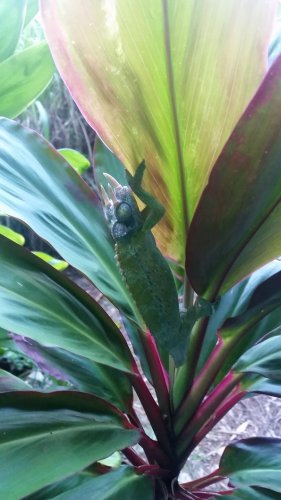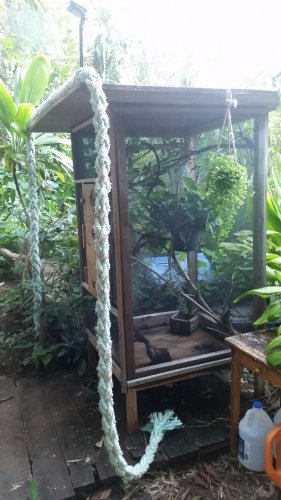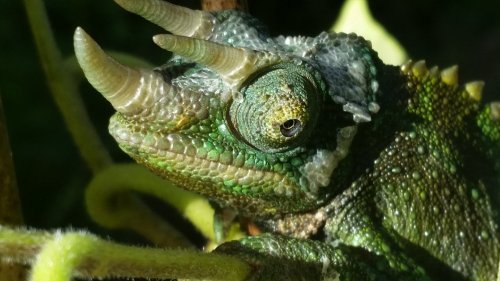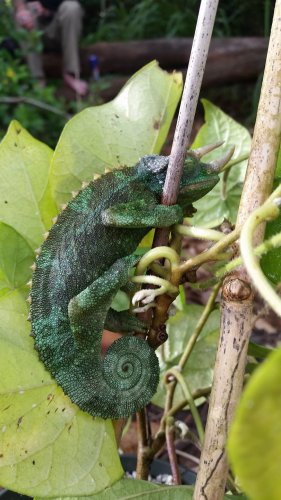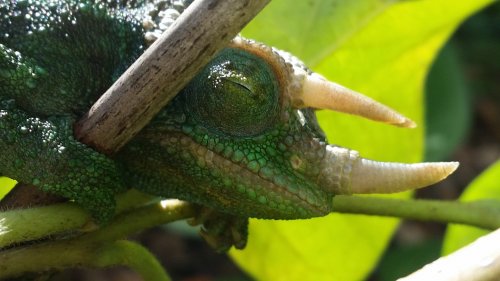FloydPakasloslo
Member
Chameleon Info:
Cage Info:
Current Problem - Chameleon has been very healthy and active until about 4 days ago when he suddenly became very lethargic. Eyes are open, but not as often or wide as usual. Still drinks water occasionally, but I have not seen him eat in several days. Mostly he just lays on a branch with his head on the branch. I suspect it may be MBD. I have thought there wasn't enough sun getting into the cage but I wanted advice from people with more experience. Unfortunately, taking him to a vet is just not really an option.
I would really like advice on if it is MBD, and if so, what exact route is best. Currently I plan on getting liquid calcium, and getting him out in the sun twice a day, but I would like to know about how long. I will also be manipulating his cage to have a partial screen roof so there is more filtered light in his cage during the day. Currently he is only getting a few hours partial sun and I'm not sure it is enough. If needed, I can get photos tomorrow.
- Your Chameleon - Jackson's, sub/young adult male, I have cared for him for about 2-3 months now
- Handling - Only as needed, maybe 1-2 times a week
- Feeding - Crickets, currently fed cat food. Changing that to greens and veggie scraps. Occasionally fed wild insects (small ground roaches, grasshoppers) from organic garden
- Supplements - None, need advice
- Watering - Dripper system as needed (if I am not home for a day or two) but once to twice daily soaks of the whole cage with a hose
- Fecal Description - Seems normal, have not noticed changes except in frequency. Used to be once every day or two, have not noticed in past 2-3 days. Have not tested for parasites.
- History - He was wild caught in Waialua, HI (a somewhat hot, dry area of North Shore Oahu) and given to me after the person decided they did not have the time to care for him properly any longer.
Cage Info:
- Cage Type - Screen and wood, 2.5W 2.5L 4H, wooden top and bottom
- Lighting - None- outdoor cage, natural light only.
- Temperature - Outdoor cage, normal climate ranges from low 50's at night in winter, to low 80's in summer.
- Humidity - Unknown, humid tropical climate. Regular waterings
- Plants - Syngonium podophyllum, multiple tillandsia species, unknown orchid
- Placement - Outdoor, low traffic area, sheltered by natural plants and trees from wind. About 8-10" off the ground
- Location - Pupukea, Oahu, HI
Current Problem - Chameleon has been very healthy and active until about 4 days ago when he suddenly became very lethargic. Eyes are open, but not as often or wide as usual. Still drinks water occasionally, but I have not seen him eat in several days. Mostly he just lays on a branch with his head on the branch. I suspect it may be MBD. I have thought there wasn't enough sun getting into the cage but I wanted advice from people with more experience. Unfortunately, taking him to a vet is just not really an option.
I would really like advice on if it is MBD, and if so, what exact route is best. Currently I plan on getting liquid calcium, and getting him out in the sun twice a day, but I would like to know about how long. I will also be manipulating his cage to have a partial screen roof so there is more filtered light in his cage during the day. Currently he is only getting a few hours partial sun and I'm not sure it is enough. If needed, I can get photos tomorrow.

